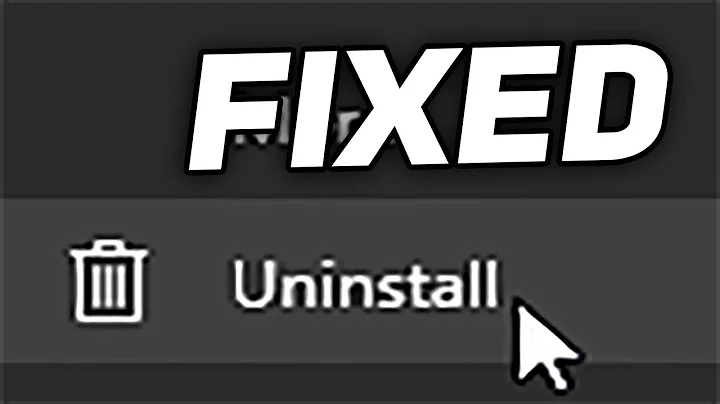When I am prompted to restart after uninstalling software, is a shutdown okay too?
Solution 1
The process explained
When you install or uninstall a program, it will register or unregister the usage of one or more .dll files.
.dll files are placed in the Windows system32/syswow64 directory when installed, and they are common files for many applications. These files often are in use at the time of uninstalling a program, and as such Windows has a built-in system to check for unused (after uninstall, no other program is using these files anymore) .dlls at shutdown to remove them when the applications that were using them are terminated (basically the uninstaller tells Windows to verify the files for deletion).
When Windows has closed the programs, it will then delete any file that is no longer assigned to a program to clean up the computer.
Rebooting necessary?
You may be wondering, if that's all there is to it, is rebooting necessary? Yes and no. Basically, you have to make sure Windows will be shutdown properly or risk leaving unnecessary files behind. If you know your computer is stable, and you will be rebooting it in a matter of hours, you really do not need to reboot your PC right now. If you regularly put your computer to sleep/hibernate and don't want to reboot as much as possible, you better do reboot for an uninstall because sleep/hibernation may cause a system to shutdown unexpectedly in the long run, which can keep files on your PC that do not need to be there anymore.
Is it harmful if these files remain on my PC?
Technically speaking, no. It's a waste of diskspace, yes, and if it happens with too many files, it may slow down your PC, because every .dll that is loaded with Windows will be adding to resources used to operate your computer.
Is there a difference between using reboot vs shutdown?
Both options will close the programs and run the necessary cleanup routines, so both are fine to use. Windows just notifies you to reboot because that way it can guarantee that Windows is being kept tidy.
Is it okay if I hold the power button so the computer is turned off immediately?
No. This is not a normal shutdown, and thus Windows will not be able to run the cleanup routine. You can see this option as if Windows was crashed.
Solution 2
One thing to note is Windows 8/8.1 has a hybrid boot option that's enabled by default (or at least for me it was). This doesn't reload the some kernel files at boot to achieve a faster power up/down state. However, this feature is bypassed if you restart.
If you're messing with software that uninstalled drivers it may (also) be wasting resources. I always like a reboot better for this reason, although I doubt it would really help unless I uninstalled a driver/updated a service pack/etc., although Windows might intelligently know to not hibernate the kernel and do a cold boot.
EDIT: it seems as you can do a "standard" shutdown by doing this:
Shutdown /s /t 0
It will still use the hybrid boot the next time your computer turns on. You can turn off hybrid boot in control panel.
It seems as Windows is the most affected by restarting, but I think that it might be best to restart other OSes. For example, if uninstalling PHP, restarting the computer would restart Apache, and that could avoid some errors if Apache doesn't realize PHP was uninstalled. General rule of thumb: reboot while you grab a cup of coffee and come back. It'd be best just to do that to make sure everything runs smoothly.
Solution 3
A restart is a shutdown followed by another power up. It would not matter, since any application prompting for reboot is installed within the OS. There is nothing it can do on its own when the OS is not available (during restart and shutdown as well). So for the program,in most cases it would not even know if it is a reboot or shutdown. Maybe you should do some research if it is a BIOS upgrade or something low level you do, otherwise it should be safe.
Solution 4
Some uninstalls may also need to be followed by an install which happens upon start-up. Adding a bit of time there (usually these aren't complete uninstalls, but rather a roll-back to a previous version of the software). By delaying the start-up, it opens up the possibility of mis-configuration if there are changes during the time the computer is shut down.
For example lets suppose a graphics driver is uninstalled - the generic one for that graphics adapter may be scheduled for install upon start-up, however if the adapter is swapped or removed after the shutdown but before the start-up, an improper driver may be installed instead (or rather it will likely just fail with an error).
Related videos on Youtube
Lou
I'm a SE user from England. That's about all you need to know.
Updated on September 18, 2022Comments
-
Lou almost 2 years
When I'm uninstalling an application it says that I should either restart the computer now, or manually restart later.
Will it make any difference if I shut down the computer instead?
What's the difference between the shutdown and restart operations?
-
 Admin almost 10 yearsIf you just shutdown (clean shutdown), then at some point in the future you have to startup the computer. If you do not, at some point, start the computer, then it will never work again.
Admin almost 10 yearsIf you just shutdown (clean shutdown), then at some point in the future you have to startup the computer. If you do not, at some point, start the computer, then it will never work again.
-
-
Lou almost 10 yearsOkay. The main answer I was looking for was to the question "Is there a difference between using reboot vs shutdown?", but the other information you've supplied is interesting and useful; I always appreciate it when people add information beyond the original question :).
-
 Arjan almost 10 years@Leo, I edited the title for you. Next time, please ensure the title summarizes the question instead of making the title ask something else.
Arjan almost 10 years@Leo, I edited the title for you. Next time, please ensure the title summarizes the question instead of making the title ask something else. -
 Tyson almost 10 yearsFWIW... shutdown is fine but all the same I personally usually reboot then shut down after I see that windows comes back up fine. Win7/8 rarely mess it up tho... prior to that uninstalls could be sketchier... At any rate the reason I do it this way is because what I just did is MUCH fresher in my memory.
Tyson almost 10 yearsFWIW... shutdown is fine but all the same I personally usually reboot then shut down after I see that windows comes back up fine. Win7/8 rarely mess it up tho... prior to that uninstalls could be sketchier... At any rate the reason I do it this way is because what I just did is MUCH fresher in my memory. -
user541686 almost 10 years@LeoKing: From a software standpoint, a reboot is equivalent to a full shutdown followed by starting up the computer. However, if you have Fast Boot enabled, then you won't get a "full" shutdown, and thus it may not be equivalent. Maybe this should be put in the answer. (As a side note, note that most of the actions that are supposed to take place actually take place when the computer is next started, not when it is shutting down.)
-
 Anonymous Penguin almost 10 yearsAs far as the holding the power button down: if you see Windows going through the "shutting down" messages, it's okay. If the screen just goes dark, it's not okay, and can be harmful.
Anonymous Penguin almost 10 yearsAs far as the holding the power button down: if you see Windows going through the "shutting down" messages, it's okay. If the screen just goes dark, it's not okay, and can be harmful. -
 tvdo almost 10 yearsYour explanation is... not quite right. Put plainly, the main purpose of a restart is to update or delete files that are currently in use - and this could be a wide range of files. DLL files are not the only ones that can be updated. Also, non-system libraries are not usually shared anymore, and should never placed in system directories, not since Windows 9x (oh, about 15 years ago). Also, DLLs do not need to be registered (with the exception of COM objects, but most DLLs are not COM objects, and even then global registration is discouraged nowadays).
tvdo almost 10 yearsYour explanation is... not quite right. Put plainly, the main purpose of a restart is to update or delete files that are currently in use - and this could be a wide range of files. DLL files are not the only ones that can be updated. Also, non-system libraries are not usually shared anymore, and should never placed in system directories, not since Windows 9x (oh, about 15 years ago). Also, DLLs do not need to be registered (with the exception of COM objects, but most DLLs are not COM objects, and even then global registration is discouraged nowadays). -
 ctrl-alt-delor almost 10 yearsWhy do you assume that the question is about Microsoft Windows? Is it because it talks about reboot needed on software update, and no mention of the kernel being update; A lack of mention of kernel update does not mean it was not updated, therefore it could be a different OS.
ctrl-alt-delor almost 10 yearsWhy do you assume that the question is about Microsoft Windows? Is it because it talks about reboot needed on software update, and no mention of the kernel being update; A lack of mention of kernel update does not mean it was not updated, therefore it could be a different OS. -
Mathias Lykkegaard Lorenzen almost 10 yearsThis is exactly my point that the top voted answer is missing right now.
-
 Arjan almost 10 years@richard, good point, but the question is about uninstalling software. While every now and then my Mac also wants me to reboot after an update, I've never seen that when uninstalling software. Same with Linux, though there my memory might fail me. So now I'm curious: maybe rebooting after uninstalling is actually a Windows-only thingy?
Arjan almost 10 years@richard, good point, but the question is about uninstalling software. While every now and then my Mac also wants me to reboot after an update, I've never seen that when uninstalling software. Same with Linux, though there my memory might fail me. So now I'm curious: maybe rebooting after uninstalling is actually a Windows-only thingy? -
 Anonymous Penguin almost 10 years@Arjan It seems as Windows is the most affected, but I think that it might be best to restart other OSes. For example, if uninstalling PHP, restarting the computer would restart Apache, and that could avoid some errors if Apache doesn't realize PHP was uninstalled.
Anonymous Penguin almost 10 years@Arjan It seems as Windows is the most affected, but I think that it might be best to restart other OSes. For example, if uninstalling PHP, restarting the computer would restart Apache, and that could avoid some errors if Apache doesn't realize PHP was uninstalled. -
 LPChip almost 10 yearsI'm not going to add the part that @AnnonomusPenguin placed in his answer in mine for 2 reasons. 1. I am not entirely sure about if its true which means I have to do some research (don't get me wrong, I believe you if you say it is like this, but I'm not going to blindly copy it without researching it) and 2. It already is on this page. Why place it twice?
LPChip almost 10 yearsI'm not going to add the part that @AnnonomusPenguin placed in his answer in mine for 2 reasons. 1. I am not entirely sure about if its true which means I have to do some research (don't get me wrong, I believe you if you say it is like this, but I'm not going to blindly copy it without researching it) and 2. It already is on this page. Why place it twice?




